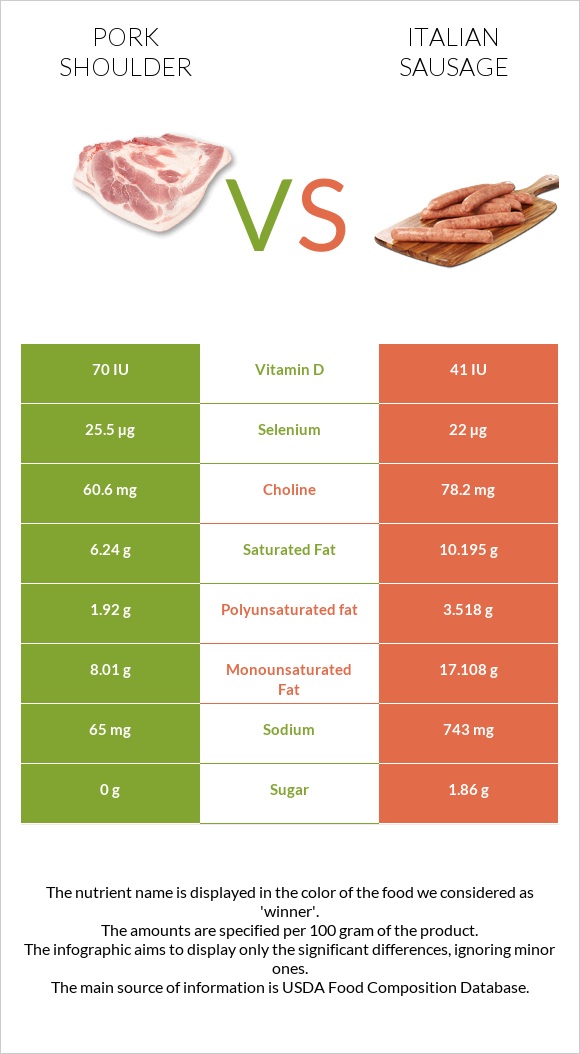Pork shoulder vs. Italian sausage — In-Depth Nutrition Comparison
Compare
How are pork shoulder and Italian sausage different?
- Pork shoulder is higher in vitamin B1 and selenium; however, Italian sausage is richer in vitamin B12, monounsaturated fat, and polyunsaturated fat.
- Daily need coverage for sodium for Italian sausage is 29% higher.
- Pork shoulder contains 2 times more vitamin D than Italian sausage. While pork shoulder contains 70 IU of vitamin D, Italian sausage contains only 41 IU.
- Pork shoulder has less saturated fat.
- Pork shoulder has a lower glycemic index (0) than Italian sausage (28).
Pork, fresh, shoulder, whole, separable lean, and fat, raw and Sausage, Italian, pork, cooked are the varieties used in this article.
Infographic

Infographic link
Mineral Comparison
Mineral comparison score is based on the number of minerals by which one or the other food is richer. The "coverage" charts below show how much of the daily needs can be covered by 300 grams of the food.
| Contains more ZincZinc | +13% |
| Contains less SodiumSodium | -91.3% |
| Contains more ManganeseManganese | +∞% |
| Contains more SeleniumSelenium | +15.9% |
| Contains more CalciumCalcium | +40% |
| Contains more IronIron | +36.2% |
Vitamin Comparison
Vitamin comparison score is based on the number of vitamins by which one or the other food is richer. The "coverage" charts below show how much of the daily needs can be covered by 300 grams of the food.
| Contains more Vitamin CVitamin C | +600% |
| Contains more Vitamin DVitamin D | +70% |
| Contains more Vitamin B1Vitamin B1 | +23.1% |
| Contains more Vitamin B2Vitamin B2 | +18% |
| Contains more Vitamin B5Vitamin B5 | +∞% |
| Contains more Vitamin AVitamin A | +400% |
| Contains more Vitamin EVitamin E | +31.6% |
| Contains more Vitamin B12Vitamin B12 | +75.7% |
| Contains more Vitamin KVitamin K | +∞% |
All nutrients comparison - raw data values
| Nutrient |  |
 |
DV% diff. |
| Sodium | 65mg | 743mg | 29% |
| Vitamin B12 | 0.74µg | 1.3µg | 23% |
| Monounsaturated fat | 8.01g | 17.108g | 23% |
| Saturated fat | 6.24g | 10.195g | 18% |
| Fats | 17.99g | 27.31g | 14% |
| Vitamin B5 | 0.719mg | 14% | |
| Vitamin B1 | 0.767mg | 0.623mg | 12% |
| Polyunsaturated fat | 1.92g | 3.518g | 11% |
| Selenium | 25.5µg | 22µg | 6% |
| Calories | 236kcal | 344kcal | 5% |
| Cholesterol | 71mg | 57mg | 5% |
| Iron | 1.05mg | 1.43mg | 5% |
| Protein | 17.18g | 19.12g | 4% |
| Vitamin D | 70 IU | 41 IU | 4% |
| Vitamin D | 1.7µg | 1µg | 4% |
| Zinc | 2.7mg | 2.39mg | 3% |
| Vitamin B2 | 0.275mg | 0.233mg | 3% |
| Vitamin K | 0µg | 3.4µg | 3% |
| Choline | 60.6mg | 78.2mg | 3% |
| Phosphorus | 182mg | 170mg | 2% |
| Vitamin B3 | 3.833mg | 4.165mg | 2% |
| Vitamin C | 0.7mg | 0.1mg | 1% |
| Carbs | 0g | 4.27g | 1% |
| Calcium | 15mg | 21mg | 1% |
| Vitamin A | 2µg | 10µg | 1% |
| Vitamin B6 | 0.348mg | 0.33mg | 1% |
| Net carbs | 0g | 4.17g | N/A |
| Magnesium | 18mg | 18mg | 0% |
| Potassium | 302mg | 304mg | 0% |
| Sugar | 0g | 1.86g | N/A |
| Fiber | 0g | 0.1g | 0% |
| Copper | 0.084mg | 0.08mg | 0% |
| Vitamin E | 0.19mg | 0.25mg | 0% |
| Manganese | 0.011mg | 0% | |
| Folate | 5µg | 5µg | 0% |
| Tryptophan | 0.208mg | 0.161mg | 0% |
| Threonine | 0.768mg | 0.792mg | 0% |
| Isoleucine | 0.781mg | 0.731mg | 0% |
| Leucine | 1.36mg | 1.343mg | 0% |
| Lysine | 1.531mg | 1.522mg | 0% |
| Methionine | 0.441mg | 0.486mg | 0% |
| Phenylalanine | 0.681mg | 0.67mg | 0% |
| Valine | 0.921mg | 0.804mg | 0% |
| Histidine | 0.656mg | 0.577mg | 0% |
Macronutrient Comparison
Macronutrient breakdown side-by-side comparison
Protein:
17.18 g
Fats:
17.99 g
Carbs:
0 g
Water:
64.02 g
Other:
0.81 g
Protein:
19.12 g
Fats:
27.31 g
Carbs:
4.27 g
Water:
47.13 g
Other:
2.17 g
| Contains more WaterWater | +35.8% |
| Contains more ProteinProtein | +11.3% |
| Contains more FatsFats | +51.8% |
| Contains more CarbsCarbs | +∞% |
| Contains more OtherOther | +167.9% |
Fat Type Comparison
Fat type breakdown side-by-side comparison
Saturated fat:
Sat. Fat
6.24 g
Monounsaturated fat:
Mono. Fat
8.01 g
Polyunsaturated fat:
Poly. Fat
1.92 g
Saturated fat:
Sat. Fat
10.195 g
Monounsaturated fat:
Mono. Fat
17.108 g
Polyunsaturated fat:
Poly. Fat
3.518 g
| Contains less Sat. FatSaturated fat | -38.8% |
| Contains more Mono. FatMonounsaturated fat | +113.6% |
| Contains more Poly. FatPolyunsaturated fat | +83.2% |





